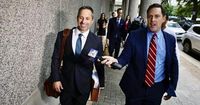On August 16, 2025, New Orleans found itself at the center of a political storm as Mayor LaToya Cantrell was indicted on criminal charges, accused of using taxpayer money to cover up an affair with her police officer bodyguard, Jeffrey Vappie. The 18-count indictment, handed down by a federal grand jury just one day prior, has sent shockwaves through the city’s political establishment, raising difficult questions about public trust, official conduct, and the blurred lines between personal and public life.
According to ABC News and The Times-Picayune, the federal indictment is both sweeping and unusually detailed, spanning 44 pages that outline a complex web of alleged misdeeds. Prosecutors allege that Cantrell and Vappie, who is now divorced and retired from the New Orleans Police Department, embarked on a series of trips together on city time, used a city-owned apartment in the Upper Pontalba building for personal purposes, and then engaged in a concerted effort to hide their relationship from federal authorities, the public, and the media. The charges range from obstruction of justice to conspiracy, with a particular focus on the alleged cover-up rather than the affair itself.
Attorney Matt Coman, who led the prosecution of former New Orleans Mayor Ray Nagin, described the indictment as “obstruction heavy.” He told The Times-Picayune, “She’s compounding her criminal exposure, needlessly. She’s also trying to hide the dollars that she’s allowing (Vappie) to bill and put in his pocket this overtime, when they’re philandering around the world. It’s not a good look.” Coman emphasized the historic nature of the case, noting, “This is a big moment,” as Cantrell is the first sitting New Orleans mayor to be indicted on such charges.
The indictment alleges that Cantrell and Vappie withheld or deleted records, lied to federal investigators, and even discussed strategies via WhatsApp to avoid detection. In one instance, Cantrell allegedly sent a photo of her hands adorned with rings and messaged, “Hey did you tell (redacted) you put a ring on it?” In another message, she is said to have written, “The times when we are truly alone (traveling) is what spoils me the most.” These digital exchanges, prosecutors argue, directly contradict Vappie’s denials of an affair to the FBI and paint a picture of deliberate concealment.
But the legal community is divided. While some see the indictment as a necessary step to uphold standards of conduct, others express skepticism about the case’s strength. Attorney Matt Chester, a former federal prosecutor who also worked on the Nagin case, told The Times-Picayune, “This is a different type of public corruption case. The allegations are serious, but this is not somebody who walked away with tens of thousands of dollars in exchange for taking an official act.” Chester noted that the sums involved are relatively low and that there is no evidence of a quid pro quo, making the case potentially difficult to sell to a jury. He pointed out that much of the indictment hinges on alleged obstruction—deleting WhatsApp messages, failing to fully answer subpoenas, and lying about the timing of enabling disappearing messages.
The charges also touch on Cantrell’s management decisions. The indictment alleges she ordered Michelle Woodfork, then interim NOPD superintendent, to return Vappie to her security detail, even as he was under investigation for timesheet irregularities. It also references a stalking allegation Cantrell filed against Anne Breaud, a French Quarter resident who photographed the mayor and Vappie in public. Although Breaud is not named in the indictment, the incident underscores the lengths to which Cantrell allegedly went to shield her private life from scrutiny.
Some observers draw parallels to other political scandals. The case echoes the downfall of Nashville Mayor Megan Barry in 2018, who resigned and pleaded guilty to felony theft after admitting to an affair with the head of her security detail. Notably, Barry accepted responsibility and stepped down, whereas Cantrell and Vappie have denied any affair. The indictment even includes a warning Cantrell received from an associate three years ago: “It’s a FELONY to have your lover be paid to work and have his travel paid for by the city. Please don’t let this be your path, LaToya!!!”
Despite the salacious details, some legal experts question whether federal prosecution is appropriate. Tulane University law professor Herbert Larson, a former federal defender, called the indictment “an incredible misuse of federal resources.” He argued, “The total alleged fraud is not even a rounding error in the city budget. You absolutely want your city officials to behave ethically, and you do not want them to misuse city funds. But it’s pretty clear to me the object of this scheme, whatever it was, was not to defraud… You’re looking at people who behaved like two teenagers hiding something from their parents.”
Pat Fanning, a former federal prosecutor and defense attorney, suggested that the indictment may have been designed to set a “perjury trap” for Cantrell, given the knowledge that she hadn’t turned over all records. He predicted Cantrell would argue that the prosecution is overreach and might attempt to compare her behavior to that of other public officials who traveled with staff. Fanning added, “Her biggest problem is for a period of several years now, she’s been accused of wrongdoing. She’s going to face a jury panel that already thinks she’s crooked.”
For Cantrell, the political ramifications are immediate and potentially severe. Even if she leaves office before the case goes to trial, the legal and reputational damage may linger. As Coman observed, “Jury selection started a long time ago. She’ll be gone, but she won’t be forgotten.”
Meanwhile, the city of New Orleans faces uncertainty. The charges, even if they involve relatively modest sums, have reignited debates over transparency, accountability, and the standards to which public officials should be held. Some residents and political observers worry that the scandal could further erode public trust in local government, while others argue that the prosecution itself is disproportionate to the alleged wrongdoing.
As the case moves forward under U.S. District Judge Wendy Vitter, a Trump appointee, all eyes will remain on New Orleans. The city’s first sitting mayor to face federal indictment stands at a crossroads—a cautionary tale for officials everywhere about the consequences of blurred boundaries between public duty and private life.
Whatever the outcome, this episode has already left an indelible mark on the city’s political landscape, forcing New Orleans to reckon with issues of leadership, ethics, and the enduring challenges of holding power to account.




